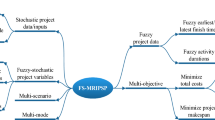Abstract
In this paper, a new method, named as Mehar’s method, is proposed for solving fully fuzzy project crashing problems and a new representation of LR flat fuzzy numbers, named as JMD representation of LR flat fuzzy numbers, are introduced. Also, it is shown that it is better to use JMD representation of LR flat fuzzy numbers as compared to the existing representation of LR flat fuzzy numbers.
Access this chapter
Tax calculation will be finalised at checkout
Purchases are for personal use only
Preview
Unable to display preview. Download preview PDF.
Similar content being viewed by others
References
Chen, S.P., Hsueh, Y.J.: A simple approach to fuzzy critical path analysis in project networks. Applied Mathematical Modelling 32, 1289–1297 (2008)
Guang, J.C., Shang, J.Z., Yan, L., Min, Z.Y., Dong, H.Z.: Research on the fully fuzzy time-cost trade-off based on genetic algorithms. Journal of Marine Science and Application 4, 18–23 (2005)
Kumar, A., Kaur, P.: A New Method for Fuzzy Critical Path Analysis in Project Networks with a New Representation of Triangular Fuzzy Numbers. Applications and Applied Mathematics: An International Journal 5, 1442–1466 (2010)
Lin, F.T.: Fuzzy crashing problem on project management based on confidence-interval estimates. In: Eighth International Conference on Intelligent Systems Design and Applications, vol. 2, pp. 164–169 (2008)
Liu, S.T.: Fuzzy activity times in critical path and project crashing problems. Cybernetics and Systems 34, 161–172 (2003); 73, 227–234 (1995)
Winston, W.L.: Operations Research: Applications and Algorithms, Singapore (2003)
Author information
Authors and Affiliations
Editor information
Editors and Affiliations
Rights and permissions
Copyright information
© 2011 Springer-Verlag Berlin Heidelberg
About this paper
Cite this paper
Kumar, A., Kaur, P., Kaur, J. (2011). Fuzzy Optimal Solution of Fully Fuzzy Project Crashing Problems with New Representation of LR Flat Fuzzy Numbers. In: Kuznetsov, S.O., Ślęzak, D., Hepting, D.H., Mirkin, B.G. (eds) Rough Sets, Fuzzy Sets, Data Mining and Granular Computing. RSFDGrC 2011. Lecture Notes in Computer Science(), vol 6743. Springer, Berlin, Heidelberg. https://doi.org/10.1007/978-3-642-21881-1_28
Download citation
DOI: https://doi.org/10.1007/978-3-642-21881-1_28
Publisher Name: Springer, Berlin, Heidelberg
Print ISBN: 978-3-642-21880-4
Online ISBN: 978-3-642-21881-1
eBook Packages: Computer ScienceComputer Science (R0)





